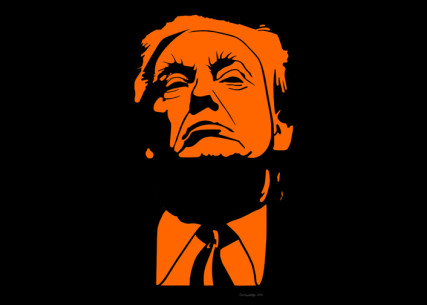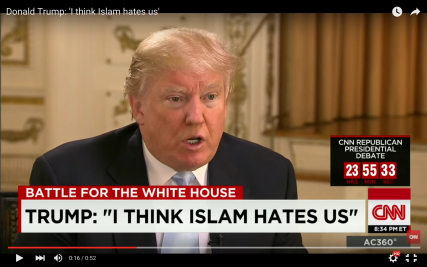
Caricature of Donald Trump by DonkeyHotey via Flickr Creative Commons https://www.flickr.com/photos/donkeyhotey/25485978382/
The rise of Donald Trump’s candidacy has evangelical leaders in a tizzy. Reports assume that “Trump is tearing evangelicals apart.” Evangelical leaders are speaking out on how Trump does not reflect evangelical beliefs and values.
The fact is that evangelicals don’t support Trump more than other Republican voters; they just vote for Trump more than evangelical leaders expect. For evangelical elites, there are too many evangelicals casting their votes for Trump.
The common thinking is that these new “Trumpvangelicals” are backsliders who don’t really care about evangelicalism or who aren’t that religious. That would be great for evangelicals’ elites: See, these so-called evangelicals are voting for Trump because they’re not really evangelicals.
But most (all) of the commentary on evangelicals is conjecture sans data. We know from exit polls that many are choosing Trump, but no one really knows why this is happening.
A new survey gives us hard data on evangelicals and Trump. The American National Election Study pilot study for 2016 is a complete data set available for researchers to analyze. Unlike exit polls, we can drill-down beyond simple percentages to see 1) whether or not evangelicals are different than other voters and 2) if so, why they’re different.
READ “Will Ahmad need to leave America? He’s my best friend.”
The “evangelicals” in the ANES data are comparable to what you’ve seen in other surveys this year. The survey parses out white Protestants who self-identify as being born-again. This isn’t ideal (see my rant on this measure here), but it is how exit polls and news surveys are tracking evangelicals this campaign.
Here are four findings from the survey:
1. Evangelicals higher support for Trump is ideological
We can measure feelings toward Trump by using a “feeling thermometer.” People are asked to rate Trump (and other candidates) from zero (cold and completely negative) to 100 (warm and completely positive).
Evangelicals felt closer to Trump than other groups. Evangelicals gave an average score of 56, compared to 41 from other Protestants, 43 from Catholics, and 23 from black born-again Christians.
However, once we take into account political views, these differences become insignificant (both statistically and substantively). Evangelicals are more conservative and more Republican than other voters. Once these partisan and ideological differences are controlled, there ceases to be any real differences between evangelicals and other voters vanishes.
There aren’t differences between those who are more religious and less religious. Taking into account other factors, those who attend church every week are no different than those who never darken a church door.
2. Trump’s support is (in part) racist
So who does like Trump? Racists.
Even taking into account partisanship and ideology, Trump does better among racists. The ANES asked people about different stereotypes. Taking into account many other factors, the data still shows that
- people who think being “lazy” describes blacks “very well” give Trump about 10 more points than those who don’t believe blacks are lazy.
In addition, those who hold prejudices against Muslims also like Trump:
- those who think Muslims are “violent” (describes them “very well”) give Trump a 25 point bump compared to those who don’t describe Muslims as violent.
There are, of course, other factors at play. The more someone dislikes President Obama’s job as president, the more they like Trump. Trump does better among those who are older and among men. Young women who aren’t racist don’t dig the Donald.
READ Five things white supremacists believe about Donald Trump
3. Trump support among evangelicals is also (in part) racist
That’s the pattern we find looking at everyone. What about among just evangelicals?
First the bad news: Much of the support is based on racism. Those who think blacks are lazy give Trump over 27 more points than those who do not hold this stereotype.
The good news for evangelical leaders is that there is a major difference between those who attend church and those who don’t. Evangelicals who rarely or never attend church are bully on Trump, giving Trump 22 points higher than those who attend frequently and 26 points more than those who attend weekly.
Put the good and the bad together and you find
- Trump’s strongest support among racist evangelicals who aren’t active in church, and
- Trump’s least support among evangelicals who attend church regularly and do not hold racist stereotypes.
Together, there is about a 50 point difference between these two groups.
There are other divisions, too. When it comes to feelings toward Trump, there are significant differences between older and younger evangelicals, men and women, and Democrats and both Republicans and Independents.
4. Among just Republicans, anti-Muslim views matter more
Looking just at Republicans, the data finds that there are important differences that are rooted in religion. There aren’t differences between religious groups; evangelicals and other groups are still the same. But there are differences between those who aren’t religious compared to those who are.
Trump gets higher support among Republicans who rarely or never attend church. These Republicans give Trump a score about 10 points higher than those who attend church regularly. Trump gets another 11 points or so from those who are atheist, agnostic, or don’t claim a religion.
Religion also arises in the stereotypes that drive Trump support. Among just Republicans, the view that Muslims are violent that raises support by as much as 30 points.
Bottom-line: Evangelicals like Trump based on politics, not religion. But among evangelicals Trump reveals divisions rooted in racism and religious commitment.
Don’t miss any more posts from the Corner of Church & State. Click the red subscribe button in the right hand column. Follow @TobinGrant on Twitter and on the Corner of Church & State Facebook page.

